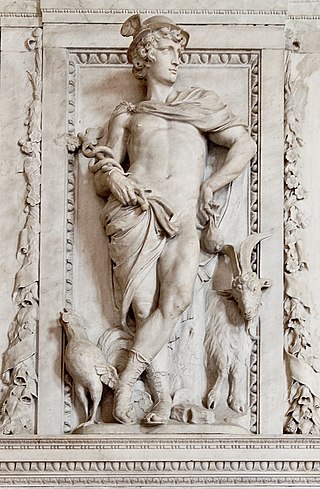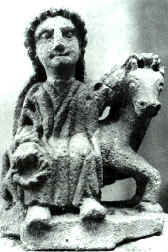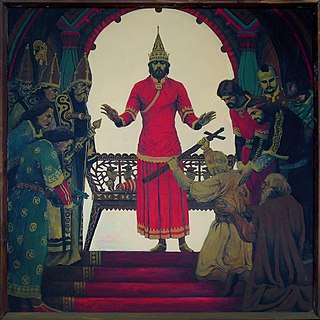This article needs additional citations for verification .(October 2007) |
In ancient Celtic religion, Rudianos was a war god worshiped in Gaul. In Roman times he was connected with Mars.
This article needs additional citations for verification .(October 2007) |
In ancient Celtic religion, Rudianos was a war god worshiped in Gaul. In Roman times he was connected with Mars.
He was invoked at Saint-Andéol-en-Quint [1] and Rochefort-Samson (Drôme), and at Saint-Michel-de-Valbonne. The name "Rudianos" means 'red', [2] reflecting the warlike nature of the god. At Saint-Michel-de-Valbonne there was also found a prehistoric image of a mounted war-god, dating to the 6th Century BC, who could perhaps be Rudianos himself. The menhir-shaped stone depicts a roughly incised figure of a horseman, with an enormous head, riding down five severed heads. The iconography is evocative of the head-hunting exploits of the Celts, who hung the heads of their battle victims from their saddles, according to classical writers.

In ancient Celtic and Gallo-Roman religion, Cernunnos or Carnonos is a god depicted with antlers, seated cross-legged, and is associated with stags, horned serpents, dogs and bulls. He is usually shown holding or wearing a torc and sometimes holding a bag of coins and a cornucopia. He is believed to have originally been a Proto-Celtic God. There are more than fifty depictions and inscriptions referring to him, mainly in the north-eastern region of Gaul.

Týr is a god in Germanic mythology, a valorous and powerful member of the Æsir and patron of warriors and mythological heroes. In Norse mythology, which provides most of the surviving narratives about gods among the Germanic peoples, Týr sacrifices his right hand to the monstrous wolf Fenrir, who bites it off when he realizes the gods have bound him. Týr is foretold of being consumed by the similarly monstrous dog Garmr during the events of Ragnarök.

Mercury is a major god in Roman religion and mythology, being one of the 12 Dii Consentes within the ancient Roman pantheon. He is the god of financial gain, commerce, eloquence, messages, communication, travelers, boundaries, luck, trickery, and thieves; he also serves as the guide of souls to the underworld and the "messenger of the gods".
Belenus is an ancient Celtic healing god. The cult of Belenus stretched from the Italian Peninsula to the British Isles, with a main sanctuary located at Aquileia, on the Adriatic coast. Through interpretatio romana, Belenus was often identified with Apollo, although his cult seems to have preserved a certain degree of autonomy during the Roman period.

Grannus was a Celtic deity of classical antiquity. He was regularly identified with Apollo as Apollo Grannus and frequently worshipped in conjunction with Sirona, and sometimes with Mars and other deities.
In ancient Celtic religion, Sulevia was a goddess worshipped in Gaul, Britain, and Galicia, very often in the plural forms Suleviae or (dative) Sule(v)is. Dedications to Sulevia(e) are attested in about forty inscriptions, distributed quite widely in the Celtic world, but with particular concentrations in Noricum, among the Helvetii, along the Rhine, and also in Rome. Jufer and Luginbühl distinguish the Suleviae from another group of plural Celtic goddesses, the Matres, and interpret the name Suleviae as meaning "those who govern well". In the same vein, Patrizia de Bernardo Stempel connects Suleviae with Welsh hylyw 'leading (well)' and Breton helevez 'good behaviour'.

Interpretatio graeca, or "interpretation by means of Greek [models]", refers to the tendency of the ancient Greeks to identify foreign deities with their own gods. It is a discourse used to interpret or attempt to understand the mythology and religion of other cultures; a comparative methodology using ancient Greek religious concepts and practices, deities, and myths, equivalencies, and shared characteristics.

Ancient Celtic religion, commonly known as Celtic paganism, was the religion of the ancient Celtic peoples of Europe. Because there are no extant native records of their beliefs, evidence about their religion is gleaned from archaeology, Greco-Roman accounts, and literature from the early Christian period. Celtic paganism was one of a larger group of polytheistic Indo-European religions of Iron Age Europe.

Gallo-Roman religion is a fusion of the traditional religious practices of the Gauls, who were originally Celtic speakers, and the Roman and Hellenistic religions introduced to the region under Roman Imperial rule. It was the result of selective acculturation.
*Perkʷūnos is the reconstructed name of the weather god in Proto-Indo-European mythology. The deity was connected with fructifying rains, and his name was probably invoked in times of drought. In a widespread Indo-European myth, the thunder-deity fights a multi-headed water-serpent during an epic battle in order to release torrents of water that had previously been pent up. The name of his weapon, *ml̥dʰnis, which denoted both "lightning" and "hammer", can be reconstructed from the attested traditions.

The Sword of Attila, also called the Sword of Mars or Sword of God, was the legendary weapon carried by Attila the Hun.

The Eburovīcēs or Aulercī Eburovīcēs were a Gallic tribe dwelling in the modern Eure department during the Iron Age and the Roman period. They were part of the Aulerci.
The Lexovii, were a Gallic tribe dwelling immediately west of the mouth of the Seine, around present-day Lisieux, during the Iron Age and the Roman period.
The Nantuates or Nantuatae were a Gallic tribe dwelling around present-day Massongex, in the modern Canton of Valais (Switzerland) and adjacent areas of France, during the Iron Age and the Roman period.
Toutatis or Teutates is a Celtic god who was worshipped primarily in ancient Gaul and Britain. His name means "god of the tribe", and he has been widely interpreted as a tribal protector. According to Roman writer Lucan, the Gauls offered human sacrifices to him.

In ancient Roman religion and mythology, Mars is the god of war and also an agricultural guardian, a combination characteristic of early Rome. He is the son of Jupiter and Juno, and was pre-eminent among the Roman army's military gods. Most of his festivals were held in March, the month named for him, and in October, the months which traditionally began and ended the season for both military campaigning and farming.
Gaulish is an extinct Celtic language spoken in parts of Continental Europe before and during the period of the Roman Empire. In the narrow sense, Gaulish was the language of the Celts of Gaul. In a wider sense, it also comprises varieties of Celtic that were spoken across much of central Europe ("Noric"), parts of the Balkans, and Anatolia ("Galatian"), which are thought to have been closely related. The more divergent Lepontic of Northern Italy has also sometimes been subsumed under Gaulish.
The Dexivates were a small Gallic tribe dwelling in the southern part of modern Vaucluse, near the present-day village of Cadenet, during the Iron Age and the Roman period.
The Vediantii were a Celto-Ligurian tribe dwelling on the Mediterranean coast, near present-day Nice, during the Iron Age and the Roman period.